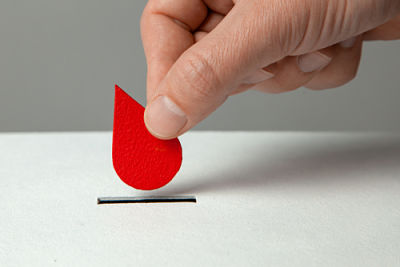
This is a picture of someone holding a cut out of a blood drop lowering it down to a black line
National Volunteer Blood Donor Month
Did you know that January is designated as National Volunteer Blood Donor month. In 1969, President Nixon signed Proclamation 3952 and wrote, "Genuine concern for his fellow man has always distinguished the American citizen. That concern finds daily expression in countless acts of voluntary service to the less fortunate, the sick, and the injured. No manifestation of this generosity of spirit is more expressive, and no gift more priceless in time of personal crisis, than the donation of one's blood. The voluntary blood donor truly gives life itself." The month of January is an appropriate time to observe this important national event. First, it is traditionally a month of significant need. Elective surgeries are often postponed during the busy holiday season and scheduled during the month of January. As a result, the need for blood donation increases in the first full winter month. In addition, it is a time for declaring resolutions for change in our lives. What better resolution than to donate blood every season - making a lifesaving difference for others?
How to Help
Give blood. Don't wait for a disaster. Someone needs blood now! Contact your local blood bank for more information. Use #NationalBloodDonorMonth and #GiveBlood to share on social media. Here are some of the biggest reasons giving blood is so important.
About 36,000 units of red blood cells and 7,000 units of platelets are needed every single day in the U.S.
The most requested blood type by hospitals is type O. This kind of blood can be transfused to patients of all blood types, so it's always in great demand and very short supply. Only 7% of people in the U.S. have type O.
A single car accident victim may need up to 100 pints of blood to survive.
About 6.8 million people donate blood every year in the U.S.
38% of our population is eligible to donate, but less than 10% actually do.
Donating blood is a simple, safe process. All you have to do is register, take a mini medical history test and then donate.
A single donation from a single patient can help more than one person.
Sabetha Community Hospital uses blood from the Community Blood Center. The center offers 5-6 blood drives a year in Sabetha. Get out and give blood the next time they are in town.
